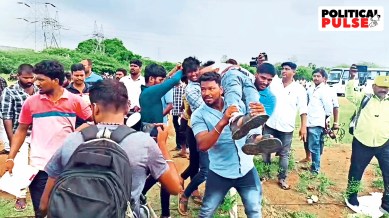As Samsung strike enters second month, ruling DMK faces alliance heat, Tamil Nadu police detain union leaders
Since September 9, more than a thousand workers have been on protest. Now, questions are being raised over the state government's handling of the crisis

As the labour strike at Samsung’s plant on the outskirts of Chennai enters its second month, threatening Tamil Nadu’s business-friendly reputation and exposing cracks in the ruling DMK’s political alliance, there appears to be no immediate resolution to the stalemate.
Early Wednesday morning, Tamil Nadu police detained 11 key union leaders and allegedly dismantled protest tents. Since September 9, more than a thousand workers affiliated to the Centre of Indian Trade Unions (CITU) have been pressing for recognition of their newly formed union and improved working conditions.
monthly limit of free stories.
with an Express account.
The police action came ahead of the visit of top leaders of DMK’s alliance partners, including Congress, CPI(M), CPI, MDMK, and VCK, to the protest site on Wednesday.
When the protest started in early September, it was a critical time for Chief Minister M K Stalin, who was on a US tour to woo global investments. The DMK prides itself on Tamil Nadu’s business-friendly environment, but the timing of the protest by a DMK ally – just as Stalin was signing deals abroad – was seen by many in the party as a betrayal by the CITU and CPM, which has long supported the Stalin government.
Samsung India has, meanwhile, been reluctant to engage with the CITU, ostensibly spooked by recent developments beyond India’s borders. In July, Samsung Electronics faced unrest at its Seoul plant, where more than 6,500 workers went on strike demanding better pay and working conditions. According to reports, rumours of North Korean communist involvement had spooked management, fostering a cautious approach to unionisation, particularly in communist-linked labour protests.
The company’s stance in Tamil Nadu was clear: they would negotiate directly with workers, but not with outside leaders heading the CITU. The company, which started the plant in 2007 and has not faced such an issue before, also has concerns that allowing CITU a foothold in Sriperumbudur could create ripple effects at other plants.
Meanwhile, a request for the registration of the trade union was stopped by the state government, forcing CITU to approach the Madras High Court.
On Monday, talks led by three senior ministers, representing labour, MSME, and industries ministries, fell flat, even as Samsung agreed on increased wages and some additional benefits, and the government claimed that a settlement had been reached.
“Samsung India today signed a Memorandum of Agreement with the workmen committee of its Chennai factory… We are cognizant of the Tamil Nadu government’s efforts to end the illegal strike and are thankful to the authorities for their constant support,” their spokesperson said afterwards.
However, CITU president A Soundararajan said the workers who signed the memorandum on Monday were a few who weren’t part of the strike. He also reiterated that the strike will continue until the core demand of recognition of a union is met.
On Wednesday, Soundararajan and CITU Kancheepuram district secretary Muthukumar were among those taken into custody by the police. In an indication of the schism within the ruling alliance, VCK chief Thol Thirumavalavan as well as CPI and CPM leaders visited them in police custody.
A DMK leader told The Indian Express that while Monday’s talks “weren’t a complete failure”, “those who rushed to declare the issue resolved were overambitious and lacked experience in trade union negotiations”.
Another senior DMK leader said the party should have intervened sooner. “Top officials, including Chief Secretary N Muruganandam, one of the officers who played a key role in attracting investments to Tamil Nadu in recent years, decided to wait and see, hoping that the company would come out with a solution,” the leader said.
A top government official also agreed, “We kept talking to the company, not the workers.”
Another official said that while the CITU’s “aggressive stance” further complicated matters, someone from the DMK “ought to have picked up the phone instead of depending on indirect channels”.
Allegations have also emerged of the state police profiling protesting workers and taking photos of their IDs. “When the government lacks a language and strategy to talk to protesters, it falls back on bureaucracy, which leads to profiling and threats,” said a CPI leader.
Meanwhile, the CITU has decided to expand the strike, calling for a one-day token strike on October 21 across the northern industrial region.
Official sources also said a key hurdle in the negotiation is the workers’ demand to recognise Muthukumar, an outsider, as the union leader. However, he said, “Management has no authority to dictate who represents the labour force… I am the only communist here, but CITU is a non-communist organisation in this case, with support from all parties. The strike is not about communism.”